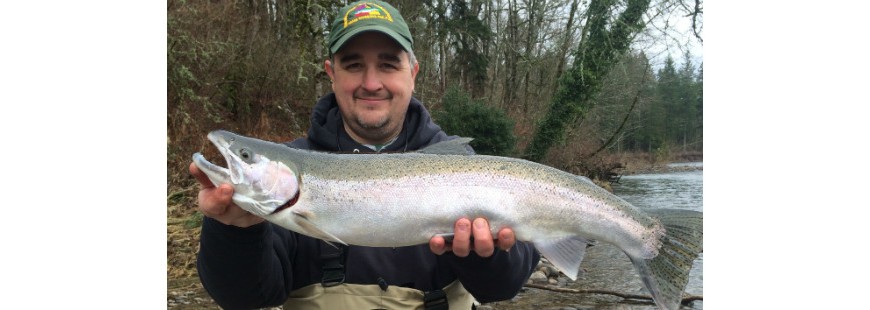Photo: Tim Wilson with a January 5th Clackamas River steelhead from the Clean Columbia fishing tournament, raising awareness of the dangers of siting the nation’s largest oil-by-rail terminal near one of our favorite fishing spots, Davis Bar on the lower Columbia River.
During the last full legislative session that the Oregon delegates convened (2015), the concept for a task force was formed to develop innovative ideas for funding for fish, wildlife and related outdoor recreation and education in Oregon. The task force was necessary given the fact that the Oregon trend for outdoor related recreation is downward, matching much of the nation. When license and tag revenues sag, the conservation programs that these revenues fund, subsequently falter.
Although many stakeholders were financially “invested” in the mission of the Oregon Department of Fish and Wildlife, hunters and anglers bore the bulk of the agency’s directive through license and tag fees, conveniently coupled up with federal match money given through federal excise tax on sportfishing equipment. With many hunters and anglers leaving the sport and not enough newcomers excited enough to replace them, this, coupled with the public pension taxpayers are left to fund, dug state agencies into a deep hole. The Oregon Department of Fish and Wildlife had one of the deepest holes to climb out of, thus, the shifting of millions of general fund dollars to secure an already bleeding agency. It wasn’t without strings however, hence, the implementation of HB 2402, the birth of the task force.
Not a new crisis for this department. Other attempts have been made to stop the bleeding, such as a tax on birdseed. After several failed attempts, the “bird seed tax” has yet to be implemented. A diverse slate of stakeholders attended their first meeting on January 12th and with so much riding on this process, it seems everyone wants to see a positive outcome to it. Sportfishing interests are not well represented on the task force, and that’s not necessarily a bad thing; we pay our fair share and we need others to step up.
What this conversation really comes down to is who owns our state’s fish and wildlife and who should pay to manage them. I think everyone knows the answers to these questions, hopefully; it’s not a reach to sell our public on the value of our fish and wildlife resources. Although it was a heavy lift in the last legislative session, law-makers could understand such concepts as the general budget paying for troublesome wildlife removal from urban areas and other agencies paying for permitting, say… wind turbines, instead of hunters and anglers. Makes sense, right?
The bottom line is, you’d be hard pressed to find any Oregonian that doesn’t want more fish and wildlife, the non-invasive type anyway. I think you would be hard pressed to find many Oregonians that wouldn’t agree that we would all be willing to pay a little bit more to secure the future of our fish and wildlife resources in our home states. Everyone owns these resources, and everyone should be investing in them.
In a previous blog post, I wrote about conceptualizing our capabilities in moving policy, on the state and federal level, if the environmental and conservation communities worked together. We’ll see if this collaborative approach comes to fruition and if this taskforce is successful in coming to consensus on future funding mechanisms to secure the solvency of this beloved agency. The biggest win would be for this task force to come up with such an innovative idea, that it could be implemented for other natural resource agencies not only regionally, but nationwide. Our state is not alone in facing this crisis and these resources don’t belong to just Oregonians, they are all of ours!
There’s a reason for some of our most recent successes; we’re working more closely together, in a strategic fashion, to accomplish a common goal. It’s a testament to what can get done when we all work collectively on a single goal, no matter how big. The better news is, as we collect our wins and build the strength of our coalitions, we’ll win bigger and better fights. We certainly have many to choose from.
The Association of Northwest Steelheaders will continue to pay close attention to all that affects us anglers here in the region. So far this year, we’re winning the access issue, we’re winning the battle of the Bakken, keeping the country’s largest oil-by-rail terminal from being sited on top of our favorite fishing beach and the Columbia River Reform Package has fact, not fiction, supporting its ongoing implementation. But we have many more challenges ahead such as the reauthorization of the Magnuson-Stevens Act, the federal fisheries law that governs most of our ocean waters. Our New Year is off to a great start, help us make it a happier one!



Pingback: The End of an Era? | Marine Fish Conservation Network